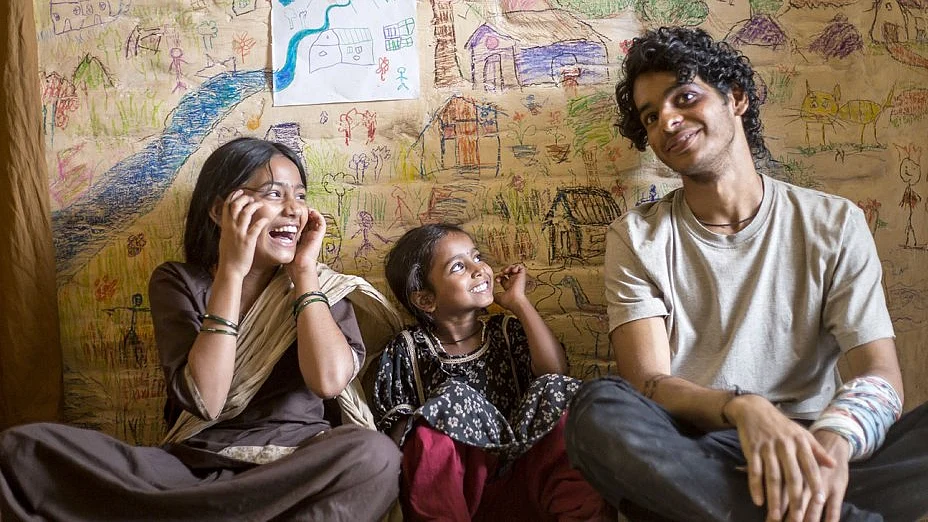Beyond the Clouds: Poetry through visuals by Majid Majidi
Beyond the Clouds, as a whole, is poetry in visuals. Majid is a master of close and mid-shots. Beautiful visuals with a deft interplay of light and shadows add to the lyrical quality of the film

It's not common to see beautiful cinema in the usual commercial releases every week. And when it's a Majid Majidi-film, there is bound to be curiosity and a lot of expectations. And that's an integral part of the beauty of 'Beyond The Clouds’ - it doesn't strive to come up to your expectations, rather flows spontaneously on screen as the master craftsman’s signature work.
It's rather impressive that a filmmaker from outside the country could understand and depict the underbelly of Mumbai so vividly, which is at once realistic, poetic, ironic, dramatic and sad, but not depressing.
The story revolves around a small-time drug peddler Amir, whose sister Tara has been imprisoned on the charges of attempt to murder Akshi (Gautam Ghose), the washerman, who was trying to rape her.
Now, Amir has no money for his sister’s bail and Tara could be released only when Akshi testifies about her innocence. Akshi, on the other hand, is unable to speak due to the injuries he has sustained, forcing Amir to take it upon himself to tend to his sister’s molestor in hospital. Circumstances are such that he is compelled to look after Akshi’s family also- his wife and two daughters.
Meanwhile, Tara befriends her ailing cellmate and her little son. Tara’s cell mate’s death propels her to look after the deceased’s son, who has never been out of prison and is completely ignorant of the outside world.
The story unfolds like a Premchand story. People are both good and bad, evil and noble, they betray, love and loathe, abuse people’s kindness; their lives are integrally interwoven with each other. In a nutshell, the pathos of the world have been beautifully brought to life.
The situations are almost Dostoyvaskian. Be it Amir's lust for Akshi's daughter, his desire to avenge what happened with his sister and the dilemma he faces over selling his daughter. While Tara willingly offers sex in return for money, she almost kills the washerman who was making unconsented advances towards her. The situation portrays basic human emotions of goodness, evil and an inherent sense of morality.
It is also impressive to see how an Iranian director could portray so effectively the diversity of languages in India and a common bond of communication in such an honest manner. In fact, in this sense, the film has a universal appeal. How different beings evolve to use a common language of communication when they are put together in a situation is surely a takeaway here.
Although the film is based in Mumbai, the local flavour in dialogues has not really been adhered to perhaps deliberately, to reach beyond the limitations of one particular society and have universal appeal.
Nevertheless, Malavika Mohanan as Tara seems to be too refined and polished in her speech. Ishaan Khattar as a debutant is impressive in his silent rage, dilemma and the childlike spark in his eyes suits the character of a growing boy who nurtures dreams, despite all the hardships. GV Sharda as Akshi’s wife is an amazing silent performer.
AR Rahman's music is average, though it could have been a strong character in itself in the film, but sadly remains the weakest aspect. Dialogues by Vishal Bharadwaj fulfill just a necessity, though succinctly. In fact, the film has a very fewer dialogues and that's one of its beauty.
But the film as a whole is a poetry in visuals by Majid Majidi. He has taken some beautiful shots of the Thane Creek and Mumbai’s famed Dhobi Ghat and the alleys of slum areas. It feels as if the director belongs to the city.
Majid is a master of close and mid-shots. The fascination for waving clothes or curtains in the wind, typical of Guru Dutt, is beautifully reflected in the film. Beautiful visuals with a deft play of light and shadows add to the lyrical quality of the film.
One subtle undercurrent in the film is its feminist nuances. The protagonist’s sister is a victim of abusive husband and trades her body whenever she needs money but refutes the lustful overtures of an ageing washer man. The protagonist sells drugs for a heartless brothel-owner, who deals with young girls as if they are cattle; Tara’s cell mate is serving a life term for killing her abusive husband, even as she dotes on her little son; Akshi’s wife comes to an unfamiliar city to look after her injured husband and finally kills him when she comes to know that he tried to rape Tara, though she is shattered in the process but picks up again with help of Amir.
Tara too is shattered and desperate to go out of the prison, here cell mate’s little son Chhotu becomes her support. Without saying it, Majid puts it across effectively how women nurture this patriarchal society, though constantly surviving its atrocities.
A sheer poetry of a film, Beyond the Clouds demands patience from its viewers, like one needs when reading Premchand’s novel.
Follow us on: Facebook, Twitter, Google News, Instagram
Join our official telegram channel (@nationalherald) and stay updated with the latest headlines
